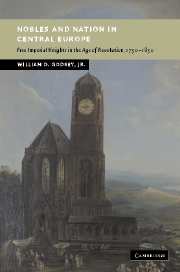Book contents
- Frontmatter
- Contents
- Preface
- Abbreviations
- Introduction
- 1 Wealth and noble autonomy: the Free Imperial Knights in Mainz on the eve of revolution
- 2 Nobles becoming Germans: the transformation of a concept
- 3 Nobles becoming Germans: the destruction of a “geo-cultural landscape”
- 4 Between destruction and survival: knights on the Middle Rhine 1750–1850
- 5 The past recaptured: knights in the Hapsburg Empire 1792–1848
- 6 From cathedral canons to priests: the Coudenhoves and the “Catholic revival”
- 7 The beginnings of conservative German nationalism: the “naturalization” of Baron Carl vom und zum Stein (1757–1831)
- Conclusion
- Appendix: Families of Free Imperial Knights (1797)
- Bibliography
- Index
Introduction
Published online by Cambridge University Press: 01 October 2009
- Frontmatter
- Contents
- Preface
- Abbreviations
- Introduction
- 1 Wealth and noble autonomy: the Free Imperial Knights in Mainz on the eve of revolution
- 2 Nobles becoming Germans: the transformation of a concept
- 3 Nobles becoming Germans: the destruction of a “geo-cultural landscape”
- 4 Between destruction and survival: knights on the Middle Rhine 1750–1850
- 5 The past recaptured: knights in the Hapsburg Empire 1792–1848
- 6 From cathedral canons to priests: the Coudenhoves and the “Catholic revival”
- 7 The beginnings of conservative German nationalism: the “naturalization” of Baron Carl vom und zum Stein (1757–1831)
- Conclusion
- Appendix: Families of Free Imperial Knights (1797)
- Bibliography
- Index
Summary
“The Free Imperial Knights are an immediate corpus of the German Empire that does not have, to be sure, a vote or a seat in imperial assemblies, but by virtue of the Peace of Westphalia, the capitulations at imperial elections, and other imperial laws exercise on their estates all the same rights and jurisdiction as the high nobility (Reichsstände).”
Johann Christian Rebmann, “Kurzer Begriff von der Verfassung der gesammten Reichsritterschaft,” in: Johann Mader, ed., Reichsritterschaftliches Magazin, vol. 3 (Frankfurt am Main and Leipzig, 1783), 564.Two hundred years have now passed since French revolutionary armies, the Imperial Recess of 1803 (Reichsdeputationshauptschluß), and the dissolution of the Holy Roman Empire in 1806 ended a matchless and seamless noble world of prebends, pedigrees, provincial Estates, and orders of knighthood in much of Central Europe. Long-forgotten secular collegiate foundations for women in Nivelles (Brabant), Otmarsheim (Alsace), Bouxières-aux-Dames (Lorraine), Essen, Konstanz, and Prague were as much a part of it as those for men at St. Alban in Mainz, St. Ferrutius in Bleidenstadt, and St. Burkard in Würzburg. The blue-blooded cathedral chapters of the Germania Sacra were scattered from Liège and Strasbourg to Speyer and Bamberg to Breslau and Olmütz. Accumulations in one hand of canonicates in Bamberg, Halberstadt, and Passau or Liège, Trier, and Augsburg had become common. This world was Protestant as well as Catholic, with some chapters, the provincial diets, and many secular collegiate foundations open to one or both confessions.
- Type
- Chapter
- Information
- Nobles and Nation in Central EuropeFree Imperial Knights in the Age of Revolution, 1750–1850, pp. 1 - 15Publisher: Cambridge University PressPrint publication year: 2004

